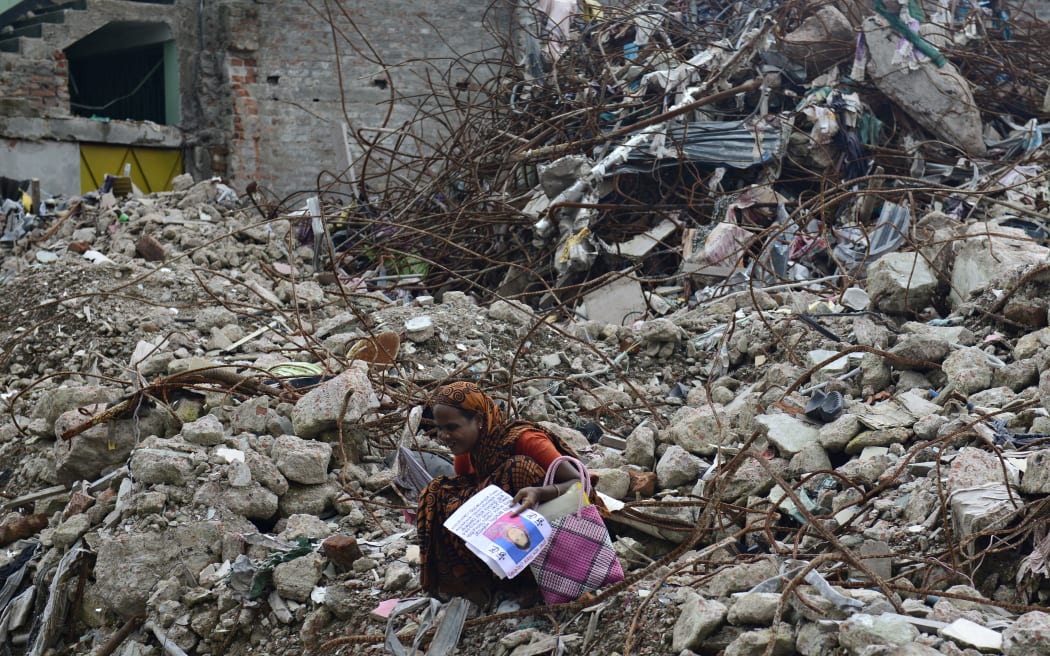Ten years on from the deadly collapse of a major factory building in Bangladesh, which produced clothes for Western brands, advocates say little appears to have changed in terms of big brands being more aware and responsible.
On this day in 2013, more than 1000 workers were killed and 2500 injured - many of whom were garment workers in the eight-storey building which housed several factories.
It was a wake-up call for the fashion industry to do better as the tragedy highlighted the workers' conditions including pay and welfare.
TearFund advocacy manager Claire Gray said many brands knew very little about their own supply chain back then.
"In the end, those workers' rights advocates had to pick through the rubble of Rana Plaza to find out what labels were being sewn onto clothes to be able to hold those brands accountable."
Since then, TearFund has been tracking 25 companies including Abercrombie & Fitch, Adidas, Big W (Woolworths), Cotton On Group, Cue Clothing Co., David Jones, Forever 21, Fruit of the Loom, Gap INC, H&M, Hanesbrands, Inditex, Just Group, Kathmandu, Kmart Group, Lacoste, Levi Strauss and Co, Lululemon Athletica, Myer, New Balance, Nike, Patagonia, Puma, Sussan Group and VF Corp.
Now, 80 percent of those companies could provide a list of factories that made their products.
But nothing had changed when it came to paying workers a living wage.
In 2013, TearFund asked whether they could guarantee the supply chain workers were paid a living wage - only one company could say yes.
Ten years later, it was the same story.

A mourner grieves for her relative, missing and presumed dead, at the Rana Plaza garment building collapse during the one hundredth-day anniversary of the disaster on 2 August, 2013, in Savar, on the outskirts of Dhaka. Photo: AFP / Munir Uz Zaman
Gray said the industry was making billions by exploiting workers.
"Ninety-eight percent of workers who work in garment factories do not have enough to meet their basic needs, so this means that a factory worker could work full-time plus overtime and still not be able to provide adequate housing or food for their family."
That came as a shock to shoppers RNZ spoke to in downtown Auckland.
"It just makes you kind of upset that you're buying things, but the money's not going towards the people who made it," one person said.
"I'd like to know where my stuff is coming from and I'd like to know that the company is being fair, especially if they're well known."
"The worker should be paid enough to pay the cost of living," another said.
Modern slavery specialist and sustainability consultant Gary Shaw said the findings pointed to a wider issue in the fashion industry.
"The sad reality in 2023 is that there are still more people in the world today in slavery and in some form of modern slavery than at any other time in human history."
While brands should take ownership for what factory workers were paid, it was a complex issue as many factories overseas were used by multiple brands, Shaw said.
"A lot of the businesses and brands don't own the factories where the workers make their product, you can't tell another business on the other side of the world often of which you make up a very small percentage of their global business what to pay their workers."
TearFund's research also showed just 6.7 percent of companies could provide evidence of a union or collective bargaining agreement at the factories where they had their products made.
But Gray said consumers had a major part to play to make change.
"I have sat down across the table from dozens of brands over the years and I can tell you that when they consistently hear from their customers ... about a particular issue, they sit up and pay attention.
"Every single person that wears clothes and buys clothes has some purchasing power at this equation."
One shopper told Checkpoint they were boycotting major brands and opting for op shopping instead.
Another was calling on the New Zealand government to make changes


